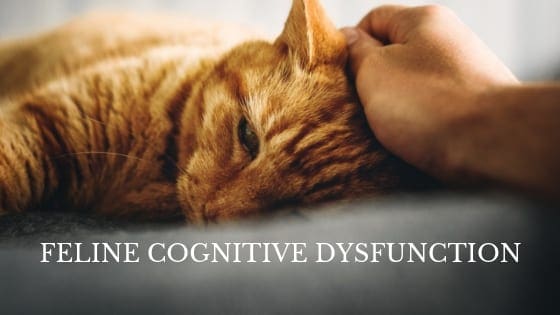
If you’ve been feeling as if your older kitty is getting senile, there may be more to it than you realize. Age-related Feline Cognitive Dysfunction, also referred to as Cognitive Dysfunction Syndrome, is the feline version of human Alzheimer’s disease. More than just the typical behavioral changes associated with age, cats with CDS can display symptoms such as increased vocalization, litter box issues, disorientation, pacing, restlessness, changes in relationships with family members, uncharacteristic avoidance of physical interaction, constipation, incontinence, irritability, among other possible symptoms.
If you suspect your cat is experiencing CDS an accurate diagnosis will need to be made by your veterinarian in order to rule out other possible underlying medical issues that could be the cause of the behavioral changes.
There is no cure for CDS but your veterinarian may prescribe medication that can slow the progression.
Helping a Cat with Cognitive Dysfunction Syndrome
Keep your environment familiar, with as little stress as possible. You may need to increase the number of litter boxes to help make things as convenient as possible for your cat. Create stairways and easy access to his favorite perches and windows. If your cat yowls at night or appears disoriented, you might need to confine him to a smaller area of the house. With some cats who become disoriented at night when the house becomes quiet and dark, it helps to have them sleep in the bedroom with you or at least leave nightlights on and perhaps leave a radio playing as well.
Help your cat with grooming if he has stopped maintaining the health of his coat. Regular brushing will help distribute the natural oils and also increase circulation.
Don’t Forget the Environment
Mental stimulation is important, so regardless of whether you’re trying to prevent CDS or are dealing with a cat who is seriously in the middle of cognitive issues, keep up the interactive play sessions and provide opportunities for environmental enrichment. Daily playtime will help your cat both physically and mentally. Environmental enrichment in the form of puzzle feeders, food treasure hunts or even age-appropriate obstacle courses can contribute to keeping your cat’s mind healthy and active. Even placing a bird feeder outside for your cat’s viewing pleasure can help create mental stimulation. It’s never too late to keep your cat mentally engaged in life!
Need More Information?
If you suspect your cat is experiencing age-related cognitive dysfunction, contact your veterinarian.
For more information on cat behavior and training, refer to the best-selling books by Pam Johnson-Bennett. Pam’s books are available at bookstores and online. We’ve included Amazon links here on our website.
If you have a question regarding your cat’s health, please contact your veterinarian. This article is not intended as a replacement for your cat’s veterinary care. This article is for information purposes only and not offering medical advice.
 Problem Solving & Advice by Pam Johnson-Bennett Cat Behavior Expert & Best-selling Author
Problem Solving & Advice by Pam Johnson-Bennett Cat Behavior Expert & Best-selling Author



